Thomas James Richards, Diaries, Transcript Vol. 3, 26 January to 8 November 1916 - Part 8
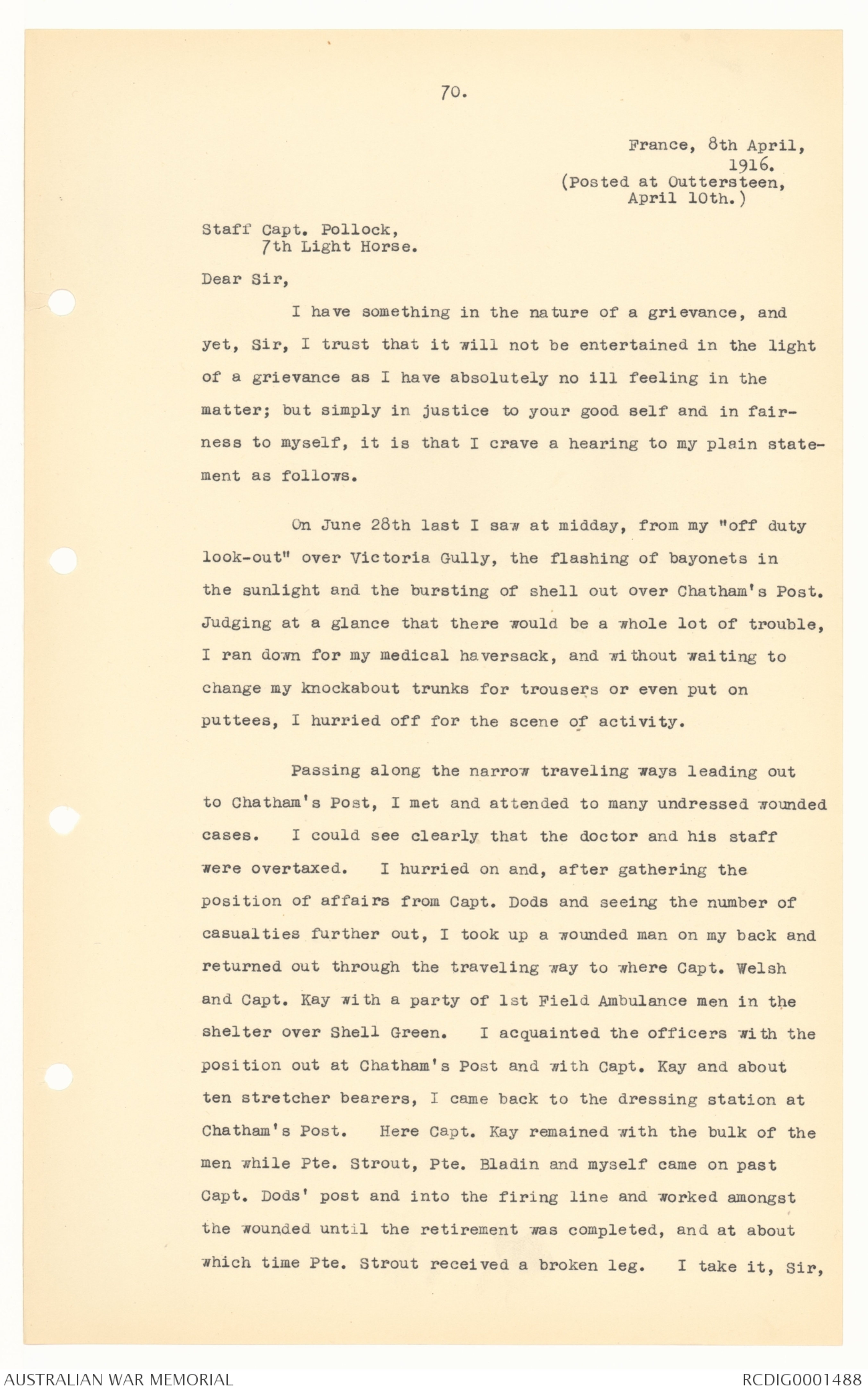
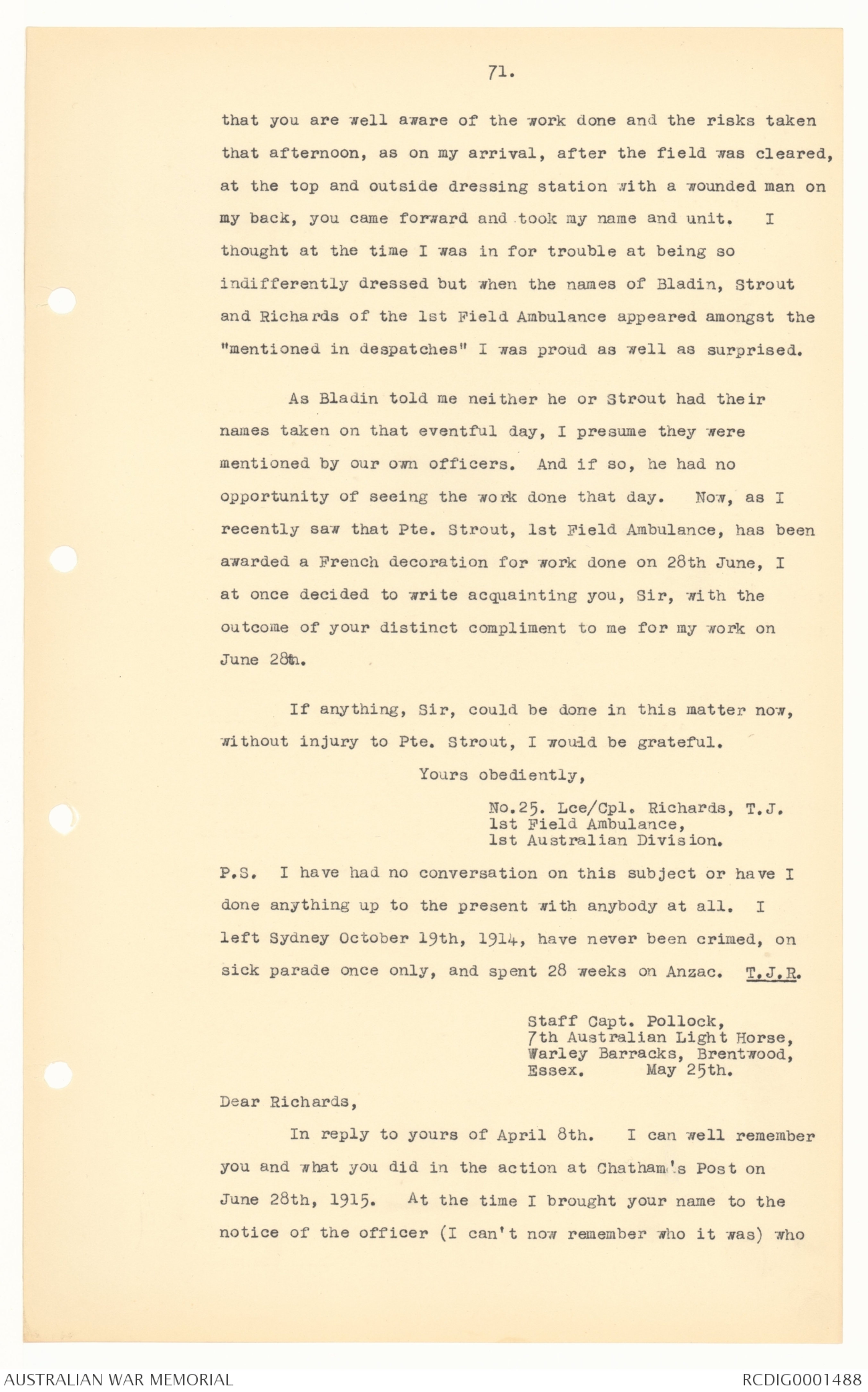
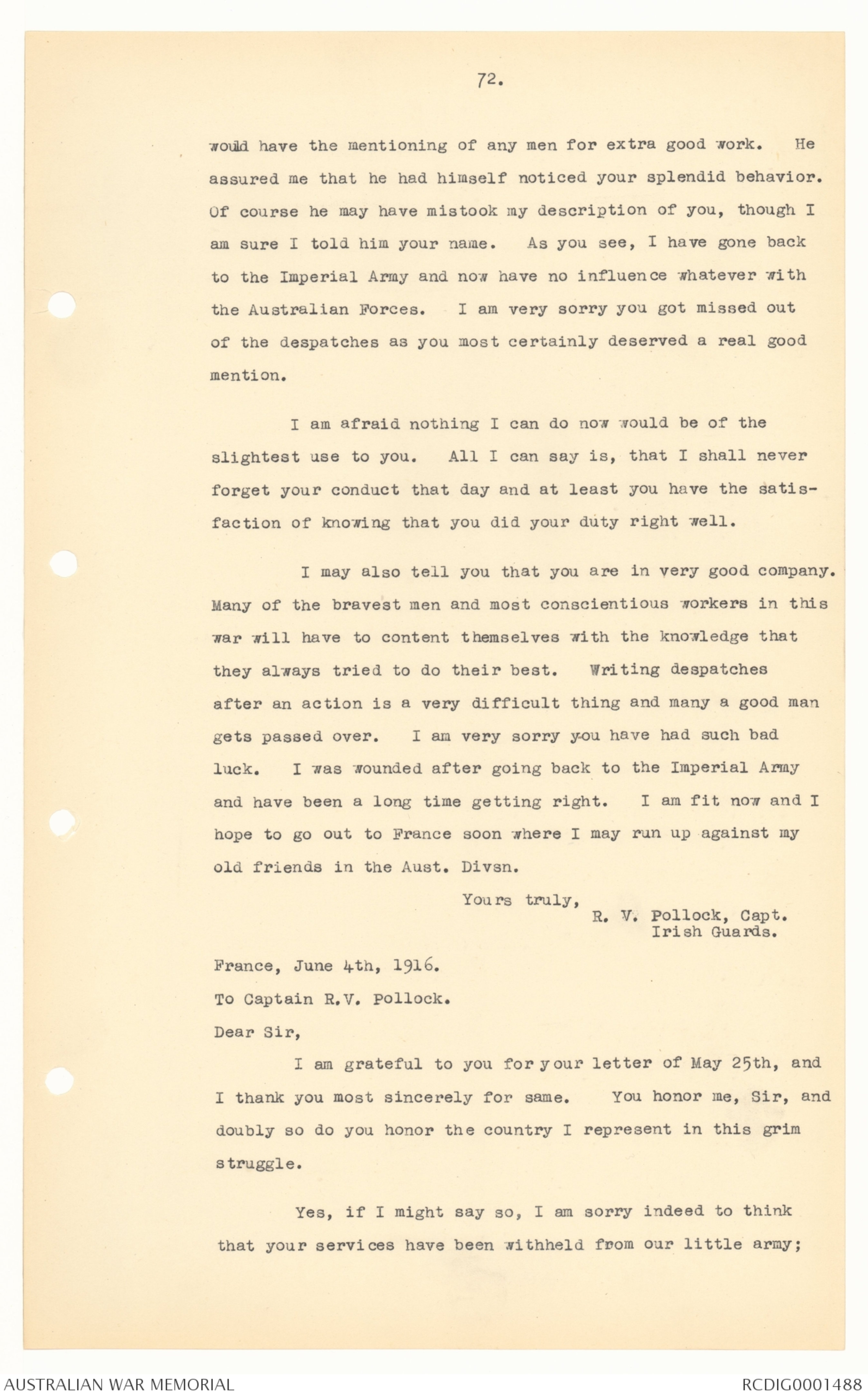
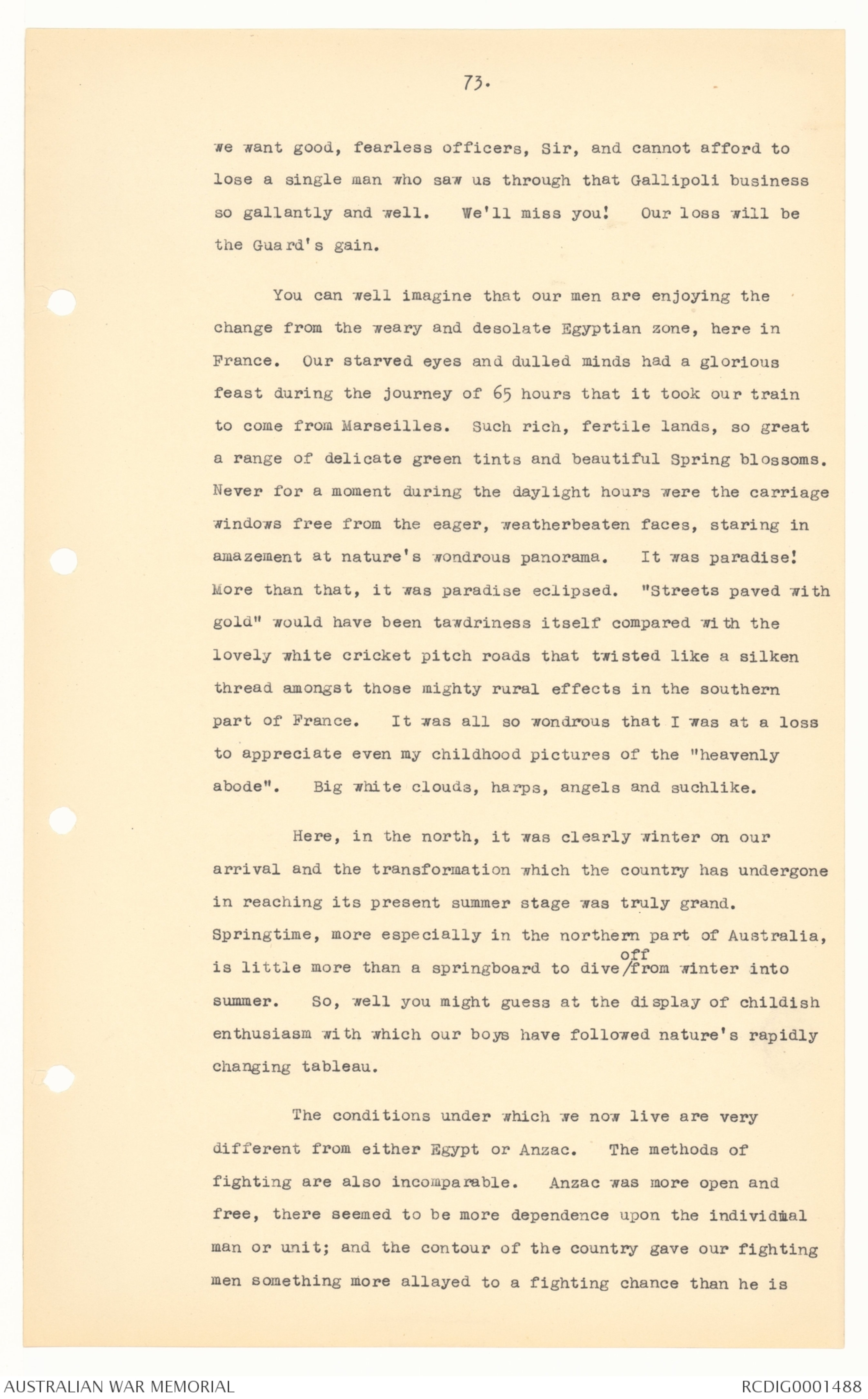
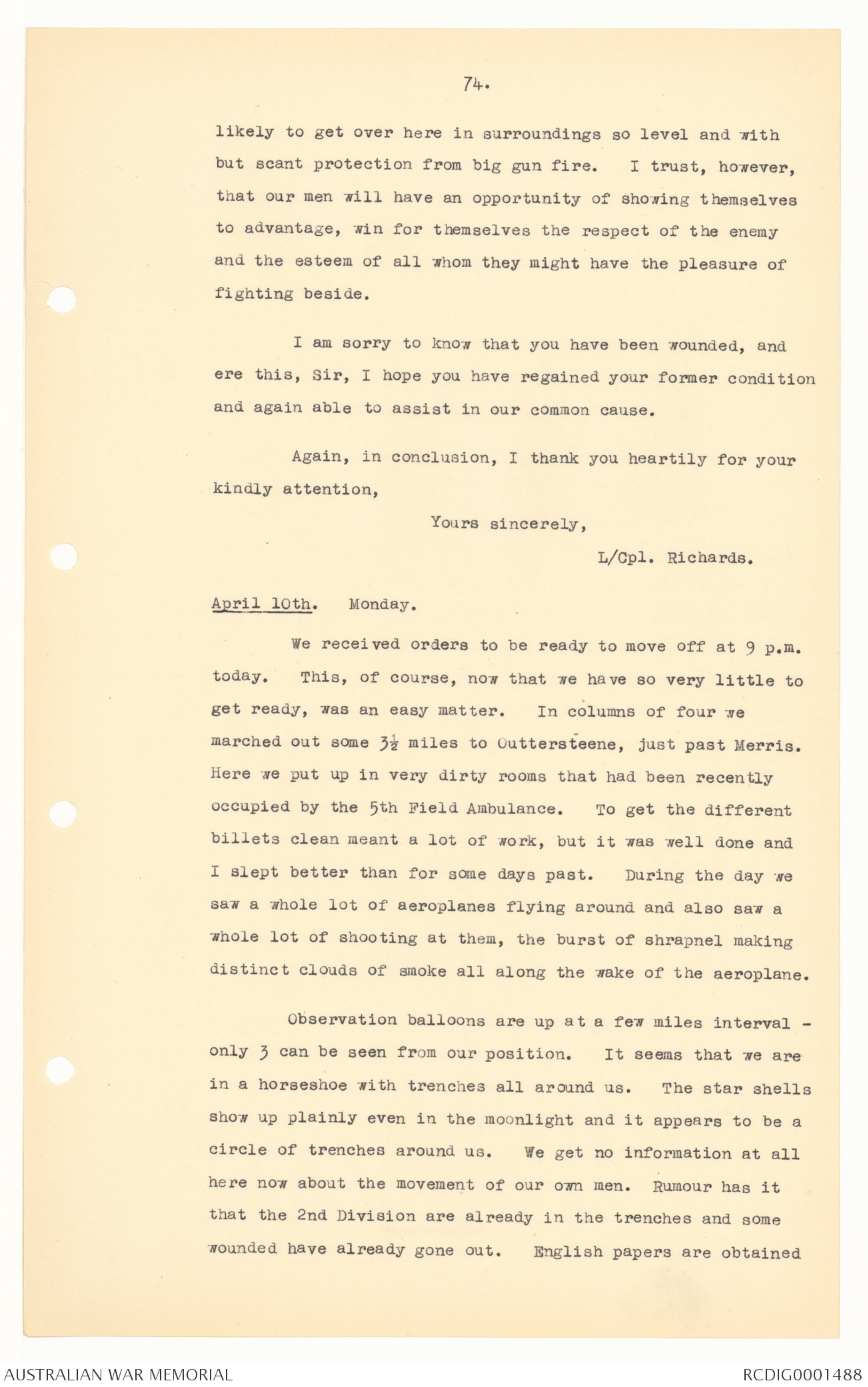
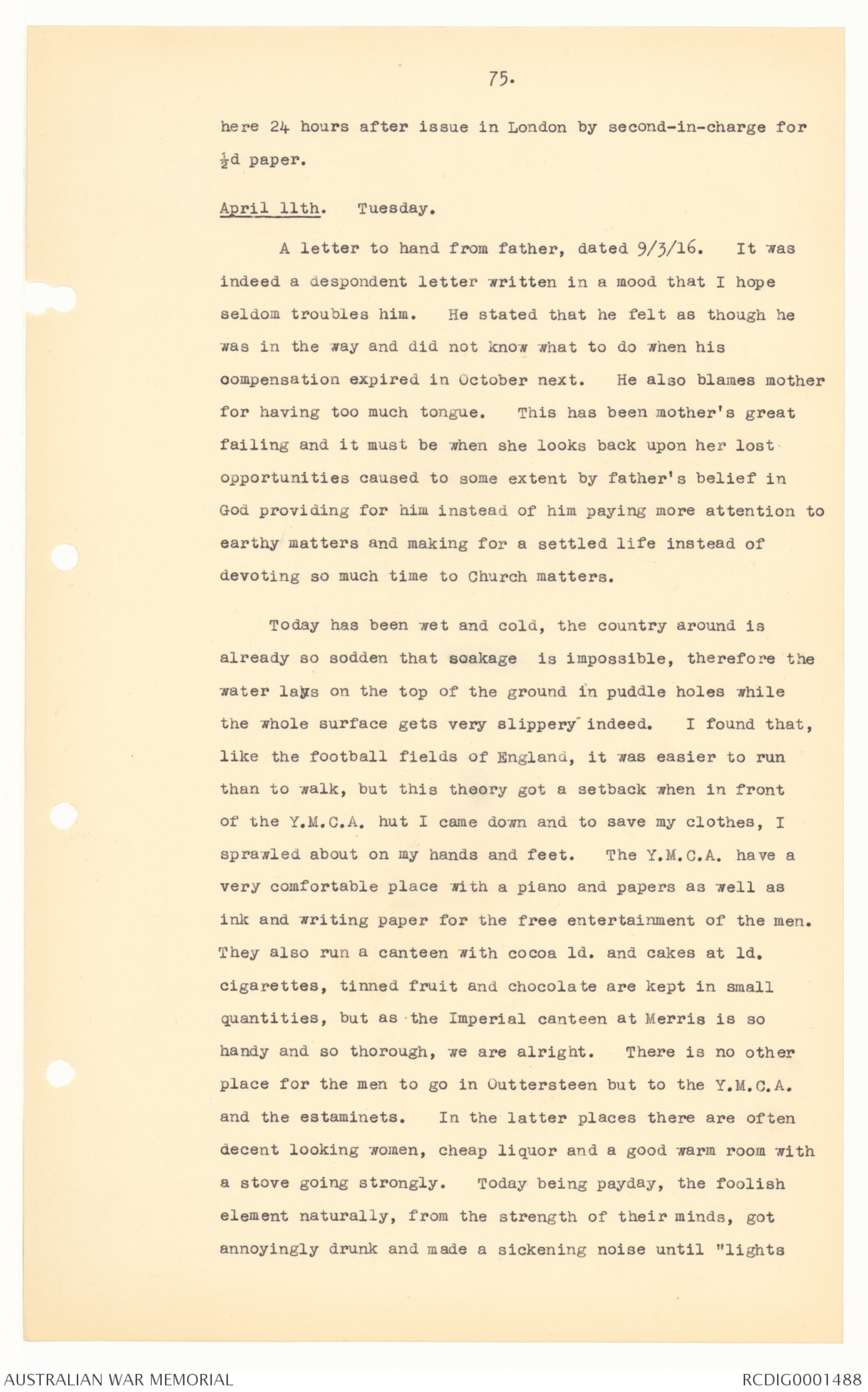
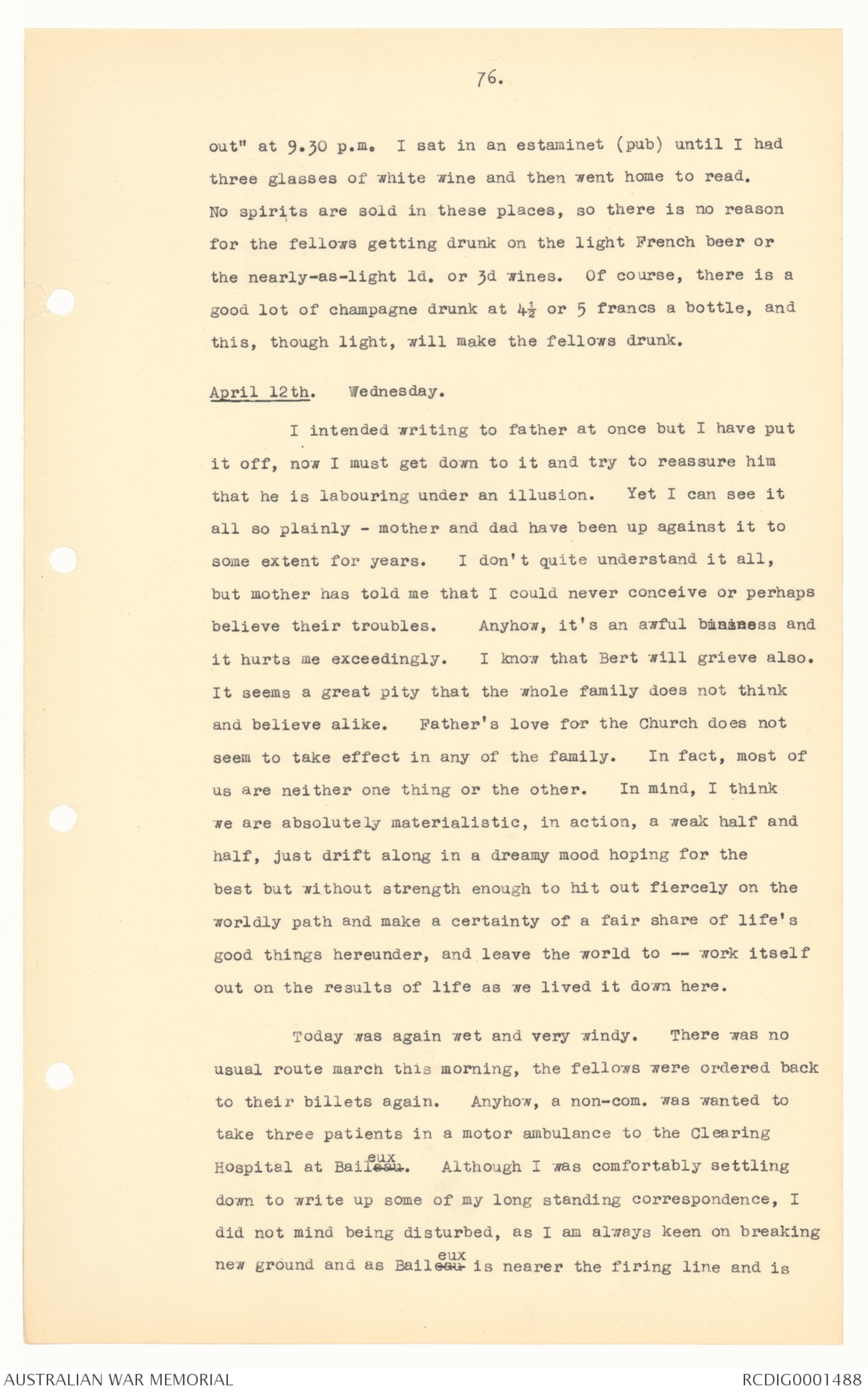
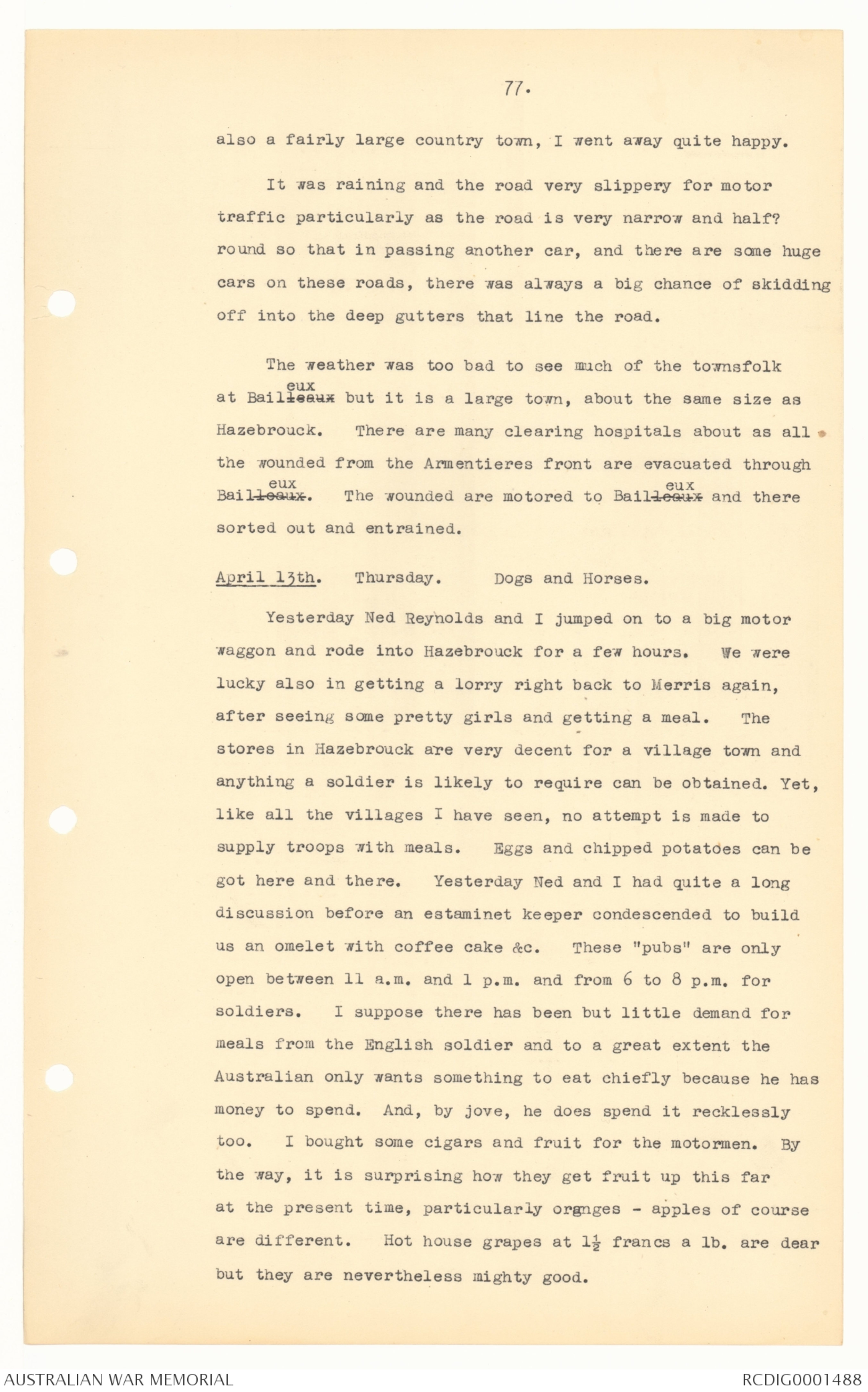
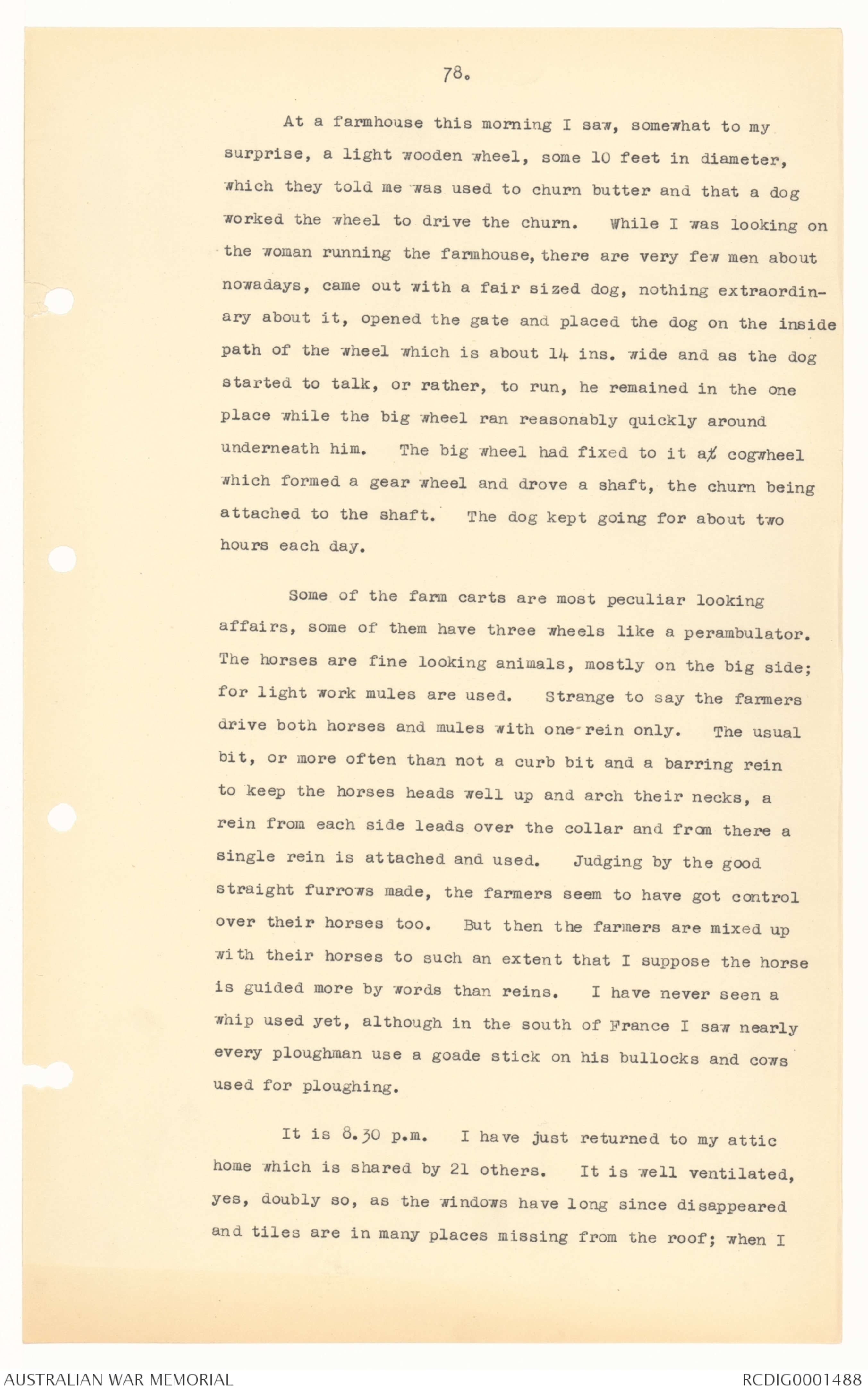
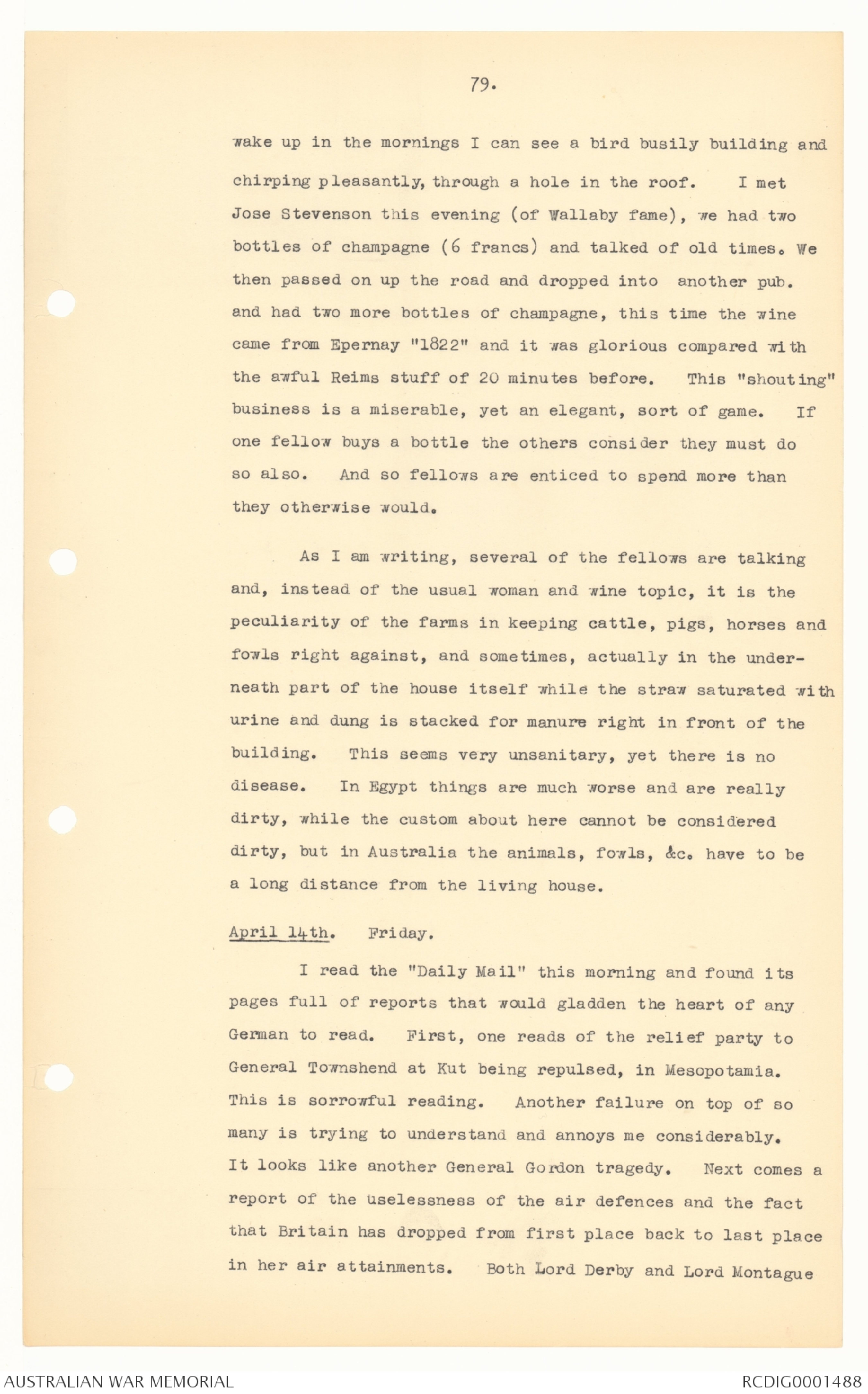
70.
France, 8th April,
1916.
(Posted at Outersteen,
April 10th.)
Staff Capt. Pollock,
7th Light Horse.
Dear Sir,
I have something in the nature of a grievance, and
yet, Sir, I trust that it will not be entertained in the light
of a grievance as I have absolutely no ill feeling in the
matter; but simply in justice to your good self and in fairness
to myself, it is that I crave a hearing to my plain statement
as follows.
On June 28th last I saw at midday, from my "off duty
look-out" over Victoria Gully, the flashing of bayonets in
the sunlight and the bursting of shell out over Chatham's Post.
Judging at a glance that there would be a whole lot of trouble,
I ran down for my medical haversack, and without waiting to
change my knockabout trunks for trousers or even put on
puttees, I hurried off for the scene of activity.
Passing along the narrow traveling ways leading out
to Chatham's Post, I met and attended to many undressed wounded
cases. I could see clearly that the doctor and his staff
were overtaxed. I hurried on and, after gathering the
position of affairs from Capt. Dods and seeing the number of
casualties further out, I took up a wounded man on my back and
returned out through the traveling way to where Capt. Welsh
and Capt. Kay with a party of 1st Field Ambulance men in the
shelter over Shell Green. I acquainted the officers with the
position out at Chatham's Post and with Capt. Kay and about
ten stretcher bearers, I came back the dressing station at
Chatham's Post. Here Capt. Kay remained the bulk of the
men while Pte. Strout, Pte. Bladin and myself came on past
Capt. Dods' post and into the firing line and worked amongst
the wounded until the retirement was completed, and at about
which time Pte. Strout received a broken leg. I take it, Sir,
71.
that you are well aware of the work done and the risks taken
that afternoon, as on my arrival, after the field was cleared,
at the top and outside dressing station with a wounded man on
my back, you came forward and took my name and unit. I
thought at the time I was in for trouble at being so
indifferently dressed but when the names of Bladin, Strout
and Richards of the 1st Field Ambulance appeared amongst the
"mentioned in despatches" I was proud as well as surprised.
As Bladin told me neither he or Strout had their
names taken on that eventful day, I presume they were
mentioned by our own officers. And if so, he had no
opportunity of seeing the work done that day. Now, as I
recently saw that Pte. Strout, 1st Field Ambulance, has been
awarded a French decoration for work done on 28th June, I
at once decided to write acquainting you, Sir, with the
outcome of your distinct compliment to me for my work on
June 28th.
If anything, Sir, could be done in this matter now,
without injury to Pte. Strout, I would be grateful.
Yours obediently,
No.25. Lce/Cpl. Richards, T.J.
1st Field Ambulance,
1st Australian Division.
P.S. I have had no conversation on this subject or have I
done anything up to the present with anybody at all. I
left Sydney October 19th, 1914, have never been crimed, on
sick parade once only, and spent 28 weeks on Anzac. T. J. R
Staff Capt. Pollock,
7th Australian Light Horse,
Warley Barracks, Brentwood,
Essex. May 25th.
Dear Richards,
In reply to yours of April 8th. I can well remember
you and what you did in the action at Chatham's Post on
June 28th, 1915. At the time I brought your name to the
notice of the officer (I can't remember who it was) who
72.
would have the mentioning of any men for extra good work. He
assured me that he had himself noticed your splendid behavior.
Of course he may have mistook my description of you, though I
am sure I told him your name. As you see, I have gone back
to the Imperial Army and now have no influence whatever with
the Australian Forces. I am very sorry you got missed out
of the despatches as you most certainly deserved a real good
mention.
I am afraid nothing I can do now would be of the
slightest use to you. All I can say is, that I shall never
forget your conduct that day and at least you have the satisfaction
of knowing that you did your duty right well.
I may also tell you that you are in very good company.
Many of the bravest men and most conscientious workers in this
war will have to content themselves with the knowledge that
they always tried to do their best. Writing despatches
after an action is a very difficult thing and many a good man
gets passed over. I am very sorry you have had such bad
luck. I was wounded after going back to the Imperial Army
and have been a long time getting right. I am fit now and I
hope to go out to France soon where I may run up against my
old friends in the Aust. Divsn.
Yours truly,
R. V. Pollock, Capt.
Irish Guards.
France, June 4th, 1916.
To Captain R.V. Pollock.
Dear Sir,
I am grateful to you for your letter of May 25th, and
I thank you most sincerely for same. You honor me, Sir, and
doubly so do you honor the country I represent in this grim
struggle.
Yes, if I might say so, I am sorry indeed to think
that your services have been withheld from our little army;
73.
we want good, fearless officers, Sir, and cannot afford to
lose a single man who saw us through that Gallipoli business
so gallantly and well. We'll miss you! Our loss will be
the Guard's gain.
You can well imagine that our men are enjoying the
change from the weary and desolate Egyptian zone, here in
France. Our starved eyes and dulled minds had a glorious
feast during the journey of 65 hours that it took our train
to come from Marseilles. Such rich, fertile lands, so great
a range of delicate green tints and beautiful Spring blossoms.
Never for a moment during the daylight hours were the carriage
windows free from the eager, weatherbeaten faces, staring in
amazement at nature's wondrous panorama. It was paradise!
More than that, it was paradise eclipsed. "Streets paved with
gold" would have been tawdriness itself compared with the
lovely white cricket pitch roads that twisted like a silken
thread amongst those mighty rural effects in the southern
part of France. It was all so wondrous that I was at a loss
to appreciate even my childhood pictures of the "heavenly
abode". Big, white clouds, harps, angels and suchlike.
Here, in the north, it was clearly winter on our
arrival and the transformation which the country has undergone
in reaching its present summer stage was truly grand.
Springtime, more especially in the northern part of Australia,
is little more than a springboard to dive/off from winter into
summer. So, well you might guess at the display of childish
enthusiasm with which our boys have followed nature's rapidly
changing tableau.
The conditions under which we now live are very
different from either Egypt or Anzac. The methods of
fighting are also incomparable. Anzac was more open and
free, there seemed to be more dependence upon the individual
man or unit; and the contour of the country gave our fighting
men something more allayed to a fighting chance than he is
74.
likely to get over here in surroundings so level and with
but scant protection from big gun fire. I trust, however,
that our men will have an opportunity of showing themselves
to advantage, win for themselves the respect of the enemy
and the esteem of all whom they might have the pleasure of
fighting beside.
I am sorry to know that you have been wounded, and
ere this, Sir, I hope you have regained your former condition
and again able to assist in our common cause.
Again, in conclusion, I thank you heartily for your
kindly attention,
Yours sincerely,
L/Cpl. Richards.
April 10th. Monday.
We received orders to be ready to move off at 9 p.m.
today. This, of course, now that we have so very little to
get ready, was an easy matter. In columns of four we
marched out some 3½ miles to Outtersteene, just past Merris.
Here we put up in very dirty rooms that had been recently
occupied by the 5th Field Ambulance. To get the different
billets clean meant a lot of work, but it was well done and
I slept better than for some days past. During the day we
saw a whole lot of aeroplanes flying around and also saw a
whole lot of shooting at them, the burst of shrapnel making
distinct clouds of smoke all along the wake of the aeroplane.
Observation balloons are up at a few miles interval -
only 3 can be seen from our position. It seems that we are
in a horseshoe with trenches all around us. The star shells
show up plainly even in the moonlight and it appears to be a
circle of trenches around us. We get no information at all
here now about the movement of our own men. Rumour has it
that the 2nd Division are already in the trenches and some
wounded have already gone out. English papers are obtained
75.
here 24 hours after issue in London by second-in-charge for
½d paper.
April 11th. Tuesday.
A letter to hand from father, dated 9/3/16. It was
indeed a despondent letter written in a mood that I hope
seldom troubles him. He stated that he felt as though he
was in the way and did not know what to do when his
compensation expired in October next. He also blames mother
for having too much tongue. This has been mother's great
failing and it must be when she looks back upon her lost
opportunities caused to some extent by father's belief in
God providing for him instead of his paying more attention to
earthy matters and making for a settled life instead of
devoting so much time to Church matters.
Today has been wet and cold, the country around is
already so sodden that soakage is impossible, therefore the
water lays on the top of the ground in puddle holes while
the whole surface gets very slippery indeed. I found that,
like the football fields of England, it was easier to run
than to walk, but this theory got a setback when in front
of the Y.M.C.A. hut I came down and to save my clothes, I
sprawled about on my hands and feet. The Y.M.C.A. have a
very comfortable place with a piano and papers as well as
ink and writing paper for the free entertainment of the men.
They also run a canteen with cocoa 1d. and cakes at 1d.
cigarettes, tinned fruit and chocolate are kept in small
quantities, but as the Imperial canteen at Merris is so
handy and so thorough, we are alright. There is no other
place for the men to go in Outtersteen but to the Y.M.C.A.
and the estaminets. In the latter places there are often
decent looking women, cheap liquor and a good warm room with
a stove going strongly. Today being payday, the foolish
element naturally, from the strength of their minds, got
annoyingly drunk and made a sickening noise until "lights
76.
out" at 9.30 p.m. I sat in an estaminet (pub) until I had
three glasses of white wine and then went home to read.
No spirits are sold in these places, so there is no reason
for the fellows getting drunk on the light French beer or
the nearly-as-light 1d. or 3d wines. Of course, there is a
good lot of champagne drunk at 4½d or 5 francs a bottle, and
this, though light, will make the fellows drunk.
April 12th. Wednesday.
I intended writing to father at once but I have put
it off, now I must get down to it and try to reassure him
that he is labouring under an illusion. Yet I can see it
all so plainly - mother and dad have been up against it to
some extent for years. I don't quite understand it all,
but mother has told me that I could never conceive or perhaps
believe their troubles. Anyhow, it's an awful business and
it hurts me exceedingly. I know that Bert will grieve also.
It seems a great pity that the whole family does not think
and believe alike. Father's love for the Church does not
seem to take effect in any of the family. In fact, most of
us are neither one thing or the other. In mind, I think
we are absolutely materialistic, in action, a weak half and
half, just drift along in a dreamy mood hoping for the
best but without strength enough to hit out fiercely on the
worldly path and make a certainty of a fair share of life's
good things hereunder and leave the world to -- work itself
out on the results of life as we lived it down here.
Today was again wet and very windy. There was no
usual route march this morning, the fellows were ordered back
to their billets again. Anyhow, a non-com. was wanted to
take three patients in a motor ambulance to the Clearing
Hospital at Baileaueux. Although I was comfortably settling
down to write up some of my long standing correspondence, I
did not mind being disturbed, as I am always keen on breaking
new ground and as Baileaueux is nearer the firing line and is
77.
also a fairly large country town, I went away quite happy.
It was raining and the road very slippery for motor
traffic particularly as the road is very narrow and half?
round so that in passing another car, and there are some huge
cars on these roads, there was always a big chance of skidding
off into the deep gutters that line the road.
The weather was too bad to see much of the townsfolk
at Baillauxeux but it is a large town, about the same size as
Hazebrouck. There are many clearing hospitals about as all
the wounded from the Armentieres front are evacuated through
Baillauxeux. The wounded are motored to Bailleauxeux and there
sorted out and entrained.
April 13th. Thursday. Dogs and Horses.
Yesterday Ned Reynolds and I jumped on to a big motor
waggon and rode into Hazebrouck for a few hours. We were
lucky also in getting a lorry right back to Merris again,
after seeing some pretty girls and getting a meal. The
stores in Hazebrouck are very decent for a village town and
anything a soldier is likely to require can be obtained. Yet,
like all the villages I have seen, no attempt is made to
supply troops with meals. Eggs and chipped potatoes can be
got here and there. Yesterday Ned and I had quite a long
discussion before an estaminet keeper condescended to build
us an omelet with coffee cake &c. These "pubs" are only
open between 11 a.m. and 1 p.m. and from 6 to 8 p.m. for
soldiers. I suppose there has been but little demand for
meals from the English soldier and to a great extent the
Australian only wants something to eat chiefly because he has
money to spend. And, by jove, he does spend it recklessly
too. I bought some cigars and fruit for the motormen. By
the way, it is surprising how they get fruit up this far
at the present time, particularly oranges - apples of course
are different. Hot house grapes at 1½ francs a lb. are dear
but they are nevertheless mighty good.
78.
At a farmhouse this morning I saw, somewhat to my
surprise, a light wooden wheel, some 10 feet in diameter,
which they told me was used to churn butter and that a dog
worked the wheel to drive the churn. While I was looking on
the woman running the farmhouse, there are very few men about
nowadays, came out with a fair sized dog, nothing extraordinary
about it, opened the gate and placed the dog on the inside
path of the wheel which is about 14 ins. wide and as the dog
started to talk, or rather, to run, he remained in the one
place while the big wheel ran reasonably quickly around
underneath him. The big wheel had fixed to it at cogwheel
which formed a gear wheel and drove a shaft, the churn being
attached to the shaft. The dog kept going for about two
hours each day.
Some of the farm carts are most peculiar looking
affairs, some of them have three wheels like a perambulator.
The horses are fine looking animals, mostly on the big side;
for light work mules are used. Strange to say the farmers
drive both horses and mules with one rein only. The usual
bit, or more often than not a curb bit and a barring rein
to keep the horses heads well up and arch their necks, a
rein from each side leads over the collar and from there a
single rein is attached and used. Judging by the good
straight furrows made, the farmers seem to have got control
over their horses too. But then the farmers are mixed up
with their horses to such an extent that I suppose the horse
is guided more by words than reins. I have never seen a
whip used yet, although in the south of France I saw nearly
every ploughman use a goade stick on his bullocks and cows
used for ploughing.
It is 8.30p.m. I have just returned to my attic
home which is shared by 21 others. It is well ventilated,
yes, doubly so, as the windows have long since disappeared
and tiles are in many places missing from the roof; when I
79.
wake up in the mornings I can see a bird busily building and
chirping pleasantly, through a hole in the roof. I met
Jose Stevenson this evening (of Wallaby fame), we had two
bottles of champagne (6 francs) and talked of old times. We
then passed on up the road and dropped into another pub.
and had two more bottles of champagne, this time the wine
came from Epernay "1822" and it was glorious compared with
the awful Reims stuff of 20 minutes before. This "shouting"
business is a miserable, yet an elegant, sort of game. If
one fellow buys a bottle the others consider they must do
so also. And so fellows are enticed to spend more than
they otherwise would.
As I am writing, several of the are talking
and, instead of the usual woman and wine topic, it is the
peculiarity of the farms in keeping cattle, pigs, horses and
fowls right against, and sometimes, actually in the underneath
part of the house itself while the straw saturated with
urine and dung is stacked for manure right in front of the
building. This seems very unsanitary, yet there is no
disease. In Egypt things are much worse and are really
dirty, while the custom about here cannot be considered
dirty, but in Australia the animals, fowls, &c. have to be
a long distance from the living house.
April 14th. Friday.
I read "Daily Mail" this morning and found its
pages full of reports that would gladden the heart of any
German to read. First, one reads of the relief party to
General Townshend at Kut being repulsed, in Mesopotamia.
This is sorrowful reading. Another failure on top of so
many is trying to understand and annoys me considerably.
It looks like another General Gordon tragedy. Next comes a
report of the uselessness of the air defences and the fact
that Britain has dropped from first place back to last place
in her air attainments. Both Lord Derby and Lord Montague
 Sam scott
Sam scottThis transcription item is now locked to you for editing. To release the lock either Save your changes or Cancel.
This lock will be automatically released after 60 minutes of inactivity.